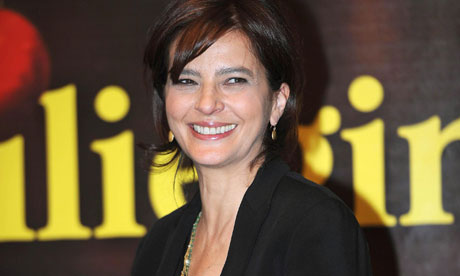
Amid the seedy showbiz excesses of the Silvio Berlusconi era in Italy over the past two decades, Laura Morante was often seen as a symbol of another, more dignified version of Italian culture.
One of the country's most famous actresses, Morante, who could be described as a kind of Italian Catherine Deneuve, is as well known for her intense roles, and the calibre of films she has starred in, as for her remarkable beauty.
Now she is hoping to exploit the changing times in her country by playing her own part in promoting a different, more powerful role for women in cinema.
For the first time, the actress is stepping into the director's role for a film in which she also stars and takes a co-writing credit. "I hope more films get made in Italy by women, as well about women, which is rare," said Morante, who played a grieving mother in the Palme d'Or winning film The Son's Room in 2001.
The Tuscan-born actress was in Rome last week to promote Ciliegine [Cherries], a romantic comedy, just as Berlusconi's trial over paying an underage prostitute for sex returned to the headlines. New allegations have surfaced suggesting that the former prime minister has been handing out thousands of euros in cash gifts to young women who attended his "bunga bunga" parties, shortly before they are due to testify.
"The last 20 years in Italy have had a dramatic effect on the female image," Morante told the Observer. "It has been a frightening return to the past and I hope to see the rise of a new feminism in this country." Morante publicly backed the thousands of Italian women who took to the streets of Italy last year to demonstrate against Berlusconi's wanton sexism.
To purge itself, she said, the country now needs a bout of soul-searching after years in which Italians were happy to leer at busty women on TV who won presenting roles on game shows, reality series and dramas after partying with the prime minister. Berlusconi stepped down in November.
"Berlusconi was both the cause and effect of all this; there was no coup d'état in Italy, even if that's painful to say," said Morante. "Sexism is like racism; you do it without realising."
Morante said she was one of a number of Italian women film directors breaking into a traditionally male-dominated profession, citing actress Valeria Golino and Francesca Comencini.
In Ciliegine, Morante plays a woman with high expectations of men who dumps her partner after he selfishly eats the lone cherry on the top of their anniversary cake. "I love ball breakers," she has said. "They are always protecting something precious and vulnerable."
Her role is the latest in a series of complex characters she has played in a career that took off when she was cast by Bernardo Bertolucci in 1981 in his Tragedy of a Ridiculous Man, before she made two films in the 1980s with maverick director Nanni Moretti, later starring as his wife in The Son's Room.
Strong wills run in the Morante family. Laura recalls her father, a magistrate, spending hours arguing fiercely about Kafka with his sister, the writer Elsa Morante, who was married to author Alberto Moravia.
For Ciliegine, Morante has taken on the lead role – a character she describes as being between 40 and 50 – at the age of 55. Blessed with dark, magnetic eyes, she looks a decade younger, and has said she will never to resort to surgery, claiming: "If a woman spends her life accepting herself, learning to love herself, only to go under the knife to change her looks, she is making a grave mistake."
After a career shuttling between Italy and France, where she has appeared in French-language films, Morante noted one difference between the treatment of women in the two countries: "In Paris there are lots of women who go to the cinema on their own, but not in Italy."
Although Ciliegine was shot in Paris and in French after it was picked up by a French producer, the end product is not a French film, she said. "The French think it is an Italian film, while the Italians see it as a French film. There is a cultural contamination which has given birth to a kind of UFO."
When her character in the film decides she will never find the right man, convinced of the "unreliability, inadequacy and egoism" of men, she promptly meets her perfect match, only to convince herself he is gay and unobtainable.
True to her writerly background, Morante claims she was inspired to write the script by a 1907 essay by Sigmund Freud that her father had told her about, in which Freud states that people throw up obstacles to stop themselves from declaring their true love.
But beyond the intellectual undertow, Morante said the film was essentially an "affectionate parody" of the American romantic comedy. One inspiration for the film, she added, was far removed from highbrow European cinema: "I love the Peanuts cartoon strip, and the scenes where characters sit together and look at the stars is based on Charlie Brown and Linus talking about life."
The role model for Morante's strong female character, she added, was none other than the Peanuts character Lucy. "She has got that same slightly dislikeable, antipatico streak," she said.

